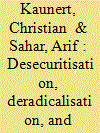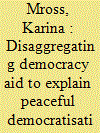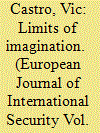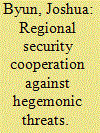|
|
|
Sort Order |
|
|
|
Items / Page
|
|
|
|
|
|
|
| Srl | Item |
| 1 |
ID:
183899


|
|
|
|
|
| Summary/Abstract |
This article assesses the processes and trends of desecuritisation through the deradicalisation of identity politics within the higher education sector in Afghanistan. It examines the desecuritisation of radicalisation through efforts directed at deradicalisation in the context of a securitised conflict environment. The article draws on the data generated through interviews and discussions with actors engaged with higher education. Higher education, while manipulated by numerous actors for ideo-political purposes, can function as a ‘desecuritisation’ and ‘deradicalisation’ mechanism by supplementing the statebuilding efforts, and more subtly, by providing a venue for critical teaching and learning processes. This article highlights that while the sector is typically a very low reconstruction priority, if addressed strategically, it has the potential to contribute to the desecuritisation of ethnic politics through the deradicalisation of ethnic grievances and hence function as a catalyst for effective and sustainable postwar recovery.
|
|
|
|
|
|
|
|
|
|
|
|
|
|
|
|
| 2 |
ID:
183898


|
|
|
|
|
| Summary/Abstract |
Democratisation is hailed as a pathway to peace by some, yet, blamed for provoking renewed violence by others. Can democracy aid explain the effect of democratisation after civil war? Building upon findings that transitions to democracy are prone to violence, this article shows that external democracy aid can mitigate such negative effects. It is the first to disaggregate democracy aid and analyse its effect on peace after civil war. To this end, it uses a configurational approach and focuses on support for competition (for example, promoting free and fair elections), institutional constraints (for example, strengthening the judiciary), and cooperation (for example, facilitating reconciliation). Combining Qualitative Comparative Analysis (QCA) with an illustrative case study on Liberia, it demonstrates that democracy aid can help to prevent recurrence during postconflict democratisation. Two pathways can explain peaceful democratisation: first, fostering ‘cooperative democratisation’ characterised by substantial support for cooperation in lower-risk contexts; and second, fostering ‘controlled competition’ by combining substantial support for institutional constraints and competition. Importantly, democracy support does not trigger renewed violence. These findings speak to the academic debate on the destabilising potential of democratisation processes after civil wars and inform policymakers designing postconflict support strategies.
|
|
|
|
|
|
|
|
|
|
|
|
|
|
|
|
| 3 |
ID:
183900


|
|
|
|
|
| Summary/Abstract |
Securitisation theory has too often been associated with the liberal state of exception and its problematic baggage. The Copenhagen School's early claims to deconstruct (not reproduce) the national security logic seem overlooked. Using the fantasy video game World of Warcraft as a large-scale thought experiment, this article asks how a distinct security mode is still possible when the normalisation of armed violence exceeds even what Carl Schmitt's political theory can provide for. Following a careful reading of Ole Wæver's formulation of the ‘existential threat’, securitisation asserts that without a certain referent object, the world becomes meaningless. As a tool for reshaping the limits of imagination, securitisation enacts political communities in World of Warcraft by turning upside down common wisdom about normalcy and security. While normal politics are violently conflictual, securitisation fills in the role of international norms and organisation, fostering supranational cooperation and erasing sovereign disputes. Securitisation thus far exceeds its contingent incarnation in the modern concept of security – a conclusion that has consequences for the normative debate on securitisation and for non-Western interpretations of the theory.
|
|
|
|
|
|
|
|
|
|
|
|
|
|
|
|
| 4 |
ID:
183897


|
|
|
|
|
| Summary/Abstract |
Why do some regional powers collectively threatened by a potential hegemon eagerly cooperate to ensure their security, while others appear reluctant to do so? I argue that robust security cooperation at the regional level is less likely when an unbalanced distribution of power exists between the prospective security partners. In such situations, regional security cooperation tends to be stunted by foot-dragging and obstructionism on the part of materially inferior states wary of facilitating the strategic expansion of neighbours with larger endowments of power resources, anticipating that much of the coalition's gains in military capabilities are likely to be achieved through an expansion of the materially superior neighbour's force levels and strategic flexibility. Evidence drawn from primary material and the latest historiography of France's postwar foreign policy towards West Germany provides considerable support for this argument. My findings offer important correctives to standard accounts of the origins of Western European security cooperation and suggest the need to rethink the difficulties the United States has encountered in promoting cooperation among local allies in key global regions.
|
|
|
|
|
|
|
|
|
|
|
|
|
|
|
|
| 5 |
ID:
183901


|
|
|
|
|
| Summary/Abstract |
The Covid-19 pandemic that emerged in the spring of 2020 caused severe political, social, and economic turmoil throughout the world. In spite of early warning signals from the World Health Organization, countries struggled to shape their policy responses and countermeasures for curtailing the spread of the virus while also minimising the damage that any restrictions would inflict on the health and well-being of society at large. While some countries have adopted strict regulations and extraordinary measures after declaring ‘states of exception’ and ‘national emergencies’, others have relied upon expert recommendations and individual responsibility. Sweden is viewed as having adopted one of the latter type of approaches in that it places the responsibility for social distancing upon the individual. Is this an instance of a failed ‘securitisation’ process, or rather a sensible constitutional and political response to a severe security event? This article presents an in-depth analysis of the Swedish strategy for coping with Covid-19, arguing that this case illustrates that security management in a democratic state should direct greater attention to rule following in accordance with a logic of appropriateness rather than the rule breaking envisaged by securitisation theory.
|
|
|
|
|
|
|
|
|
|
|
|
|
|
|
|
|
|
|
|
|